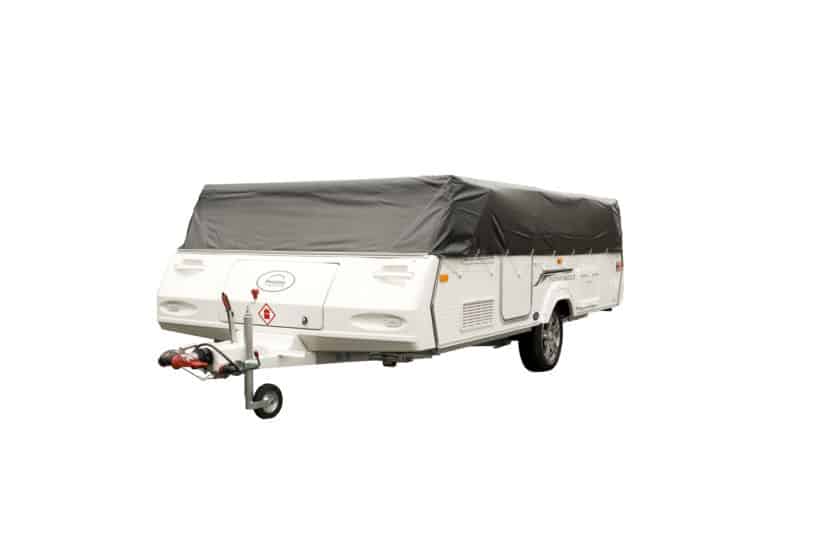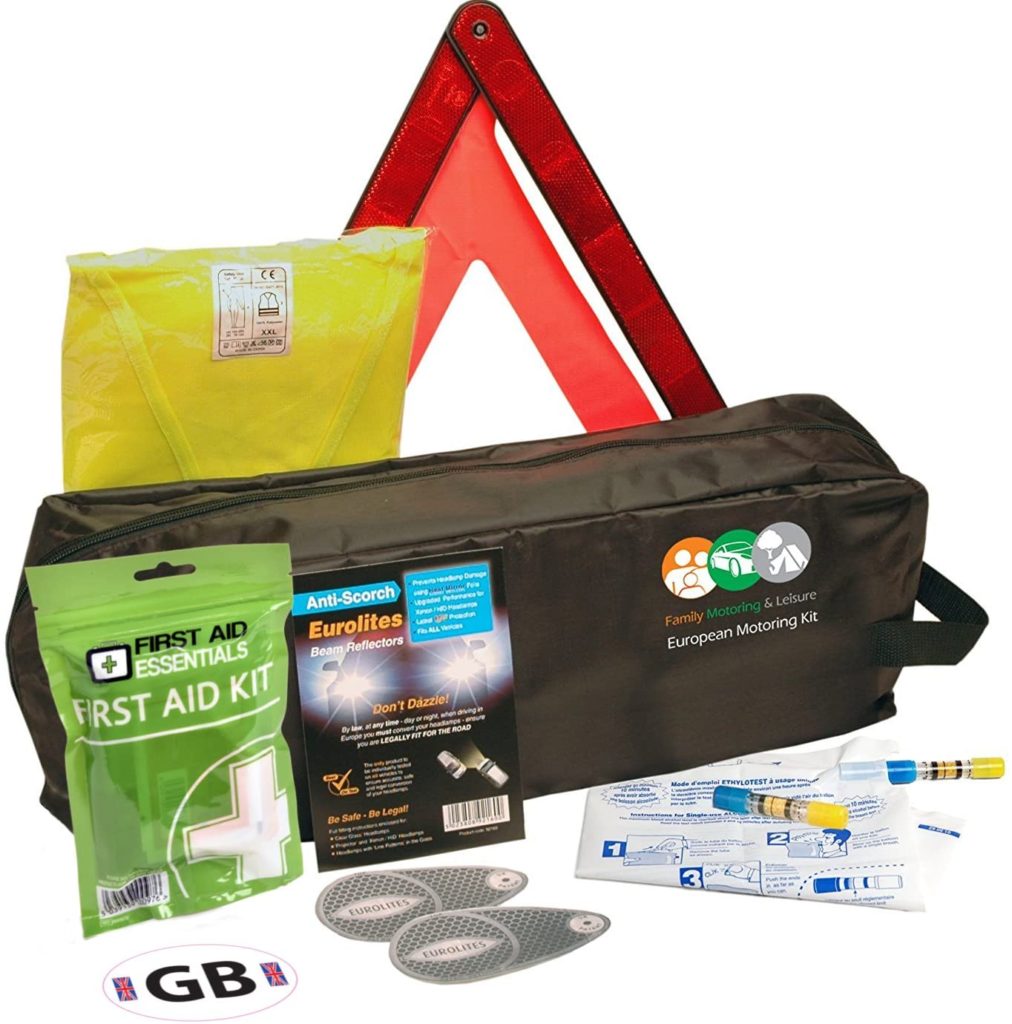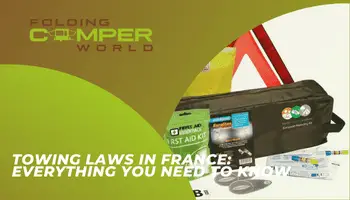If you’re going to be towing your folding camper, trailer tent, or caravan in France, it’s important to be aware of the towing laws. The last thing you want is to break the law in a foreign country.
I’ve created this blog post to tell you everything that you need to know if you’re going to be towing a trailer of some kind in France. With the advice herein, you can stay safe when towing in France. I’ve particularly covered some laws that people have been caught out by in the past, so it’s worth reading the entire post, even if you think you know all there is to know about towing in France!
Looking for a particular section? Select the link below to be taken to the appropriate part of this post.
- Will My Driving Licence Let Me Tow In France?
- What Documents Do I Need When Towing In France?
- What Equipment Do I Need When Towing In France?
- What Are The Speed Limits In France?
- Is There A Maximum Weight You Can Tow In France?
Looking to book a holiday in France? We’ve written a blog post with some of the most beautiful campsites to visit. Take a look at the blog here.
Will My Driving Licence Let Me Tow In France?
One of the biggest things to consider is whether or not your driving license will let you tow in France. Fortunately, most drivers won’t have a problem. However, there are some things that you need to be aware of.
First and foremost, people driving in France must be 18 or over and must hold a full license. Even if you’re 17 and you’ve already passed your test in England, you won’t be able to drive in France just yet. Although I haven’t personally been caught out by this rule, I’m sure that many have in the past. This is a driving offence that could result in an on-the-spot fine, so it’s important that you’re aware of it.
The average weight of a folding camper is 600kg, so most UK drivers can legally tow their folding camper in France.
Next, you can only tow a trailer with a MAM of 750kg or a larger trailer if the car and trailer combined weight 3,500kg or less if you got your UK driving license after January 1, 1997. If you gained your driving licence before this time, your driving license will be suitable for towing any folding camper (your car and trailer should have a combined weight of 8,250kg or less). Of course, if you take special training in the UK that allows you to tow more, this greater towing limit would also apply in France.
The average weight of a folding camper is 600kg, although larger models, such as the Pathfinder, will weigh more. Even if you passed your test after January 1, 1997, this means you should be able to tow a folding camper in France. However, make sure you check the MAM of your folding camper before towing it anywhere. I wrote a handy guide that you can find here, which contains the weights of the most popular folding campers.
Book a visit to Europe via Siblu, with tons of holiday types to choose from and unique holidays. Choose between family holiday locations, activity holidays, lakeside parks, or even parks near cities. Explore all the possibilities and book your dream trip by visiting Siblu today.

What Documents Do I Need When Towing In France?
If you’re going to be driving in France, there are some documents that every driver will need. In this section, I’ll cover the documents that you’ll need when driving and towing in France.
Regardless of the European country that you are travelling in, here are the documents that you will need:
- Driving Licence
- Vehicle Registration Document (V5)
- Passport
- Insurance Certificates
That covers the documents that you’ll need when driving and towing in France. Please note that you should take the insurance certificates for your car insurance as well as your folding camper insurance.
If your folding camper isn’t already insured, it’s wise to insure it before towing it. While it isn’t a legal obligation to insure your folding camper, there are lots of reasons that you should. I wrote a blog post before explaining why you should ensure your folding camper, which you can read here. I’ve also included some examples that give you a rough idea of how much you should expect to pay for your folding camper insurance.
What Equipment Do I Need When Towing In France?
When driving or towing in France, there are several pieces of equipment that you will need to ensure you are abiding by French law. The equipment I list here is equipment that you will need when driving in any European country. Chances are you already have these things in your car, but it’s best to double-check and make sure that you do.
You are required by law to carry the following items when you are driving in France:
- Warning Triangle: You will need at least one warning triangle in your vehicle. I would recommend that you have 2 or 3 in your vehicle, although it isn’t legally required. If you witness an accident or your car breaks down, you’ll want to have as many resources as possible to stay safe. I personally keep the Maypole Warning Triangle in my folding camper, and I find that this particular warning triangle is ideal as it has a standing height of 45 cm. This is perfect to be seen and can be easily packed and stored when not in use for easy transportation.
- Reflective Jackets: You must legally carry reflective jackets for everyone in the car when you are driving in France. According to French law, these reflective jackets should be in an easy-to-reach location in your vehicle. This means they really shouldn’t be stuffed under all your belongings in the boot! When we go to France, I ensure that we pack our Trespass Zig Ultra Reflective Active Jackets into our camper. These jackets are great because you can use them for everyday outdoor activities such as running or cycling. You can find the jackets here on Winfields Outdoors.
- Alcotest/Breathalyser: If you are visiting France, you should have your own alcotest in the car with you. Previously French law said that you legally had to have a breathalyser kit in the car with you. While this law isn’t in place anymore, it’s a good idea to have one in the car with you to make things run smoothly should you be pulled over. I really like the Greenwon Breathalyser from Gandado as it is not only affordable to very simple to use.
- Headlight Beam Deflectors: You must legally use headlamp converters in France. Having headlight beam deflectors fitted is a legal requirement in most European countries where you drive on the right side of the road. If you don’t have headlamp converters fitted, you can be fined on the spot by French police. My vehicle has the Streetwize Beam Deflectors, which safely direct headlight beams without blocking the light. You can find more information about them here.
On-the-spot fines can be very expensive, so it’s important to make sure you have everything that I’ve listed here. Alongside everything mentioned on this list, you should make sure that you have all of the usual emergency essentials in your vehicle too. Things such as blankets, spare bulbs and jump leads are equipment you should always keep in your vehicle no matter where you are travelling.
Book a visit to Europe via Siblu, with tons of holiday types to choose from and unique holidays. Choose between family holiday locations, activity holidays, lakeside parks, or even parks near cities. Explore all the possibilities and book your dream trip by visiting Siblu today.
If you have a look around online, you will find kits that contain everything listed above. These kits are available for as little as £20, so it’s well worthwhile purchasing one, so you’re not caught out by hefty on-the-spot fines.

What Are The Speed Limits In France?
It’s really important to ensure you abide by the speed limits in France because police can give out on-the-spot fines. In fact, French police can confiscate your licence and impound your vehicle depending on how much you are speeding.
The speed limits when driving in France will differ depending on several factors. Firstly, there are different speed limits for normal conditions, adverse weather conditions and when you are towing. I’ll list them all below so you can make sure you’re always on the right side of the law.
| Motorways | Dual Carriageways | Other Roads | Built-Up Areas | |
|---|---|---|---|---|
| Normal Conditions | 130kmh | 110kmh | 80kmh | 50kmh |
| Adverse Weather Conditions | 110kmh | 100kmh | 70kmh | 50kmh |
| Visibility Less Than 50 metres | 50kmh | 50kmh | 50kmh | 50kmh |
| Under 3.5t | 130kmh | 110kmh | 80kmh | 50kmh |
| 3.5t - 12t | 90kmh | 90kmh | 80kmh | 50kmh |
| 12t + | 90kmh | 80kmh | 60kmh | 50kmh |
If you exceed the speed limit by 40 kilometres per hour or more, your driving licence will be confiscated by the police. If you get your speed limits mixed up, it wouldn’t be too difficult to exceed the maximum speed on the road you’re using. That’s why it’s so important to make sure you keep these speeds in mind and always follow them.
The maximum speed when towing a trailer is determined by the total weight of the car and the trailer. Most cars towing folding campers will fall into the under 3.5t category, meaning you don’t have to follow a reduced speed limit. However, you must ensure that you check this. If you don’t check and police deem your vehicle and trailer to be heavier than you’re claiming, you could end up in a lot of trouble.
If you are caught speeding in France, you could face an on-the-spot fine of over 100 euros. Additionally, points could be added to your licence. If you exceed the speed limit significantly, your licence could be confiscated and your vehicle and trailer impounded.
Is There A Maximum Weight You Can Tow In France?
Depending on the licence that you hold and when you gained your licence, there are certain regulations you need to be aware of when towing in France.
On the standard UK driving licence gained after January 1, 1997, you can tow a trailer with a MAM of 750kg or a larger trailer if the car and trailer combined weight of 3,500kg or less. If you gained your driving licence before this time, your driving licence will be suitable for towing any folding camper (your car and trailer should have a combined weight of 8,250kg or less).
If you gained your driving licence after January 1, 1997, you could take training in the UK that will allow you to tow a greater weight. If you take this training, you will then be allowed to tow a greater weight in France. If you don’t take this training, err on the side of caution, so you don’t end up in bother by the French police.


